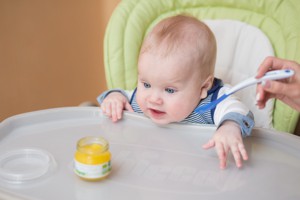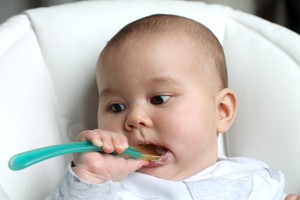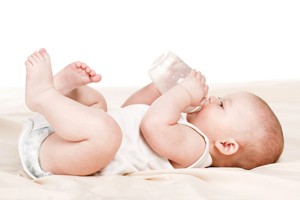 Your baby’s first tastes of solid foods can be an exciting stage in her development for the both of you. However, it’s important not to rush to start this stage, as your baby’s gentle digestive system needs time to develop enough to be able to manage foods other than breast or formula milk.
Your baby’s first tastes of solid foods can be an exciting stage in her development for the both of you. However, it’s important not to rush to start this stage, as your baby’s gentle digestive system needs time to develop enough to be able to manage foods other than breast or formula milk.
In the UK, the current recommendation by the NHS is to introduce solid foods at six months old. This is because evidence has shown that babies can get all of the nutrition they need before the age of six months from breastmilk (or formula) alone, and that furthermore, at the age of six months your baby’s digestive system has developed significantly and is able to fully digest solid food with a lower chance of picking up an infection or other illness.
However, many parents do start solid food earlier, and there is conflicting research about this issue, with some evidence indicating that babies who are weaned earlier may be less prone to developing food allergies. What is agreed on, is that your baby should not be given any solid food, including baby cereals, before the age of 17 weeks (four months), as her digestive system is simply not ready to process the food before this point.
How Do I Know My Baby Is Ready?
 Firstly, it’s important to note that an increased appetite is not a sign that your baby is ready to wean. During the first few months and years of his life, your baby will have several growth spurts, and these are typically associated with an increased appetite. During a growth spurt, your baby may seem ravenous, always needing to nurse or emptying each bottle, and possibly waking up more frequently for feeds. This is perfectly normal and it is best to simply offer more milk during these times. After a few days, your baby’s appetite will probably return to a more normal level.
Firstly, it’s important to note that an increased appetite is not a sign that your baby is ready to wean. During the first few months and years of his life, your baby will have several growth spurts, and these are typically associated with an increased appetite. During a growth spurt, your baby may seem ravenous, always needing to nurse or emptying each bottle, and possibly waking up more frequently for feeds. This is perfectly normal and it is best to simply offer more milk during these times. After a few days, your baby’s appetite will probably return to a more normal level.
There are certain signs that you should look out for that experts agree are good indicators that a baby is ready to wean. These are:
- Your baby is able to stay in a sat up position without support
- Your baby is able to pick up objects and put them in his mouth
- Your baby is able to swallow food, rather than push it out with his tongue
Other signs include your baby taking a keen interest in what you are eating. Some parents report that they began weaning after their baby helped themselves to their food. Your baby’s weight gain may have also slowed down significantly.
How Much Milk Does My Child Need During / After Weaning?
 You should continue to offer breast or formula milk feeds to your baby until they are at least one year old. The milk will still give your baby the bulk of her nutrients before this age.
You should continue to offer breast or formula milk feeds to your baby until they are at least one year old. The milk will still give your baby the bulk of her nutrients before this age.
When you first start weaning, your baby will probably drink about the same amount of milk as they did previously, as they are still getting used to eating and learning about food. As your baby grows, you will find that she will naturally take on more solids and start to reduce the amount of milk she takes. You may find that she starts to refuse one of her feeds all together, and this is normal. If your baby still has feeds during the night, you will probably find that these decrease or stop as well.
If you are formula feeding, your baby will still need around 500ml a day of formula until they are one year old. If you are breastfeeding, it is recommended that you continue to feed on demand.
